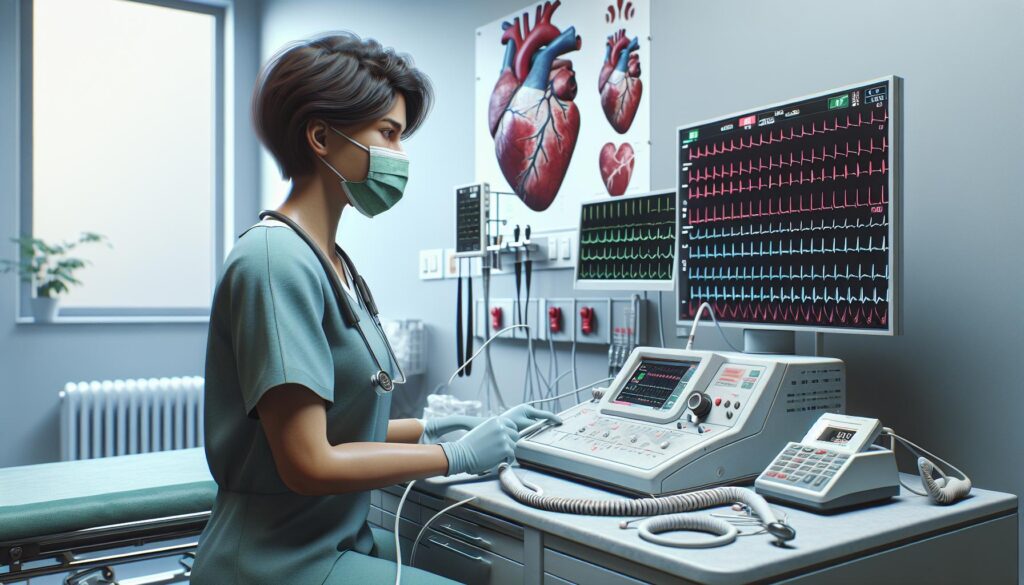Healthcare professionals who specialize in performing electrocardiograms (EKGs) play a vital role in monitoring heart health. An EKG tech, also known as an electrocardiograph technician or cardiac monitoring technician, is trained to operate sophisticated equipment that records the electrical activity of patients’ hearts. These skilled professionals work alongside doctors and nurses in various medical settings including hospitals emergency rooms and cardiac care units. They’re responsible for conducting tests that help diagnose heart conditions detecting irregular heart rhythms and identifying potential cardiac problems. The position requires both technical expertise and strong patient care skills as EKG techs must ensure accurate readings while making patients feel comfortable during the procedure.
EKG Tech Meaning
An EKG technician operates specialized medical equipment to record electrical patterns of a patient’s heart. They perform electrocardiogram tests in hospitals, clinics, cardiac care facilities.
Key Responsibilities and Duties
- Prepares patients for EKG testing by attaching electrodes to specific body areas
- Operates EKG machines to capture accurate heart rhythm readings
- Maintains patient records including test results documentation
- Schedules appointments for routine EKG procedures
- Cleans equipment according to medical facility protocols
- Recognizes abnormal heart patterns requiring immediate physician attention
- Assists physicians during stress tests monitoring cardiac activity
- Performs Holter monitoring setup for 24-48 hour heart tracking
- Completion of an accredited EKG technician certification program
- Current CPR certification from American Heart Association
- Knowledge of cardiac terminology medical software
- Strong attention to detail for electrode placement accuracy
- Communication skills for patient instruction coordination
- Physical stamina for extended standing equipment operation
- Basic computer proficiency for digital records management
- Understanding of medical privacy laws HIPAA compliance
- Ability to read interpret basic cardiac rhythms
- Mathematical skills for measuring recording heart rates
| Certification Requirements | Duration | Renewal Period |
|---|---|---|
| EKG Technician Program | 6 months | 2 years |
| CPR Certification | 1 day | 1 year |
| Clinical Training Hours | 60 hours | N/A |
The Role of EKG Technology in Healthcare

EKG technology forms the cornerstone of cardiac diagnostics in modern healthcare settings. This diagnostic tool captures electrical signals from the heart through electrodes placed on the patient’s skin.
Common EKG Procedures and Tests
EKG technology encompasses multiple diagnostic procedures that monitor heart activity:
- Resting EKG examines heart rhythm while patients lie still for 5-10 minutes
- Stress Test EKG records cardiac activity during controlled physical exercise
- Holter Monitoring tracks heart patterns continuously for 24-48 hours
- Event Monitoring captures irregular heartbeats over 30 days
- Signal-Averaged EKG detects subtle abnormalities through multiple readings
| Test Type | Duration | Patient Position |
|---|---|---|
| Resting EKG | 5-10 minutes | Lying down |
| Stress Test | 15-30 minutes | Walking/running |
| Holter Monitor | 24-48 hours | Regular activity |
| Event Monitor | Up to 30 days | Regular activity |
- Explain testing procedures in clear simple terms
- Position patients correctly on examination tables
- Clean skin areas before electrode placement
- Monitor patient comfort throughout testing
- Address concerns about equipment attachments
- Record patient symptoms during procedures
- Maintain privacy through proper draping techniques
- Document patient medical history relevant to cardiac testing
- Coordinate with healthcare teams for urgent findings
- Transfer data securely to medical record systems
Education and Training Requirements
EKG technicians require specific educational qualifications and ongoing professional development to maintain their certification. The educational path combines formal training with hands-on clinical experience.
Certification Programs
EKG certification programs consist of 120 hours of classroom instruction combined with 60 hours of clinical practice. The curriculum includes:
- Anatomy studies focusing on cardiovascular system components
- Medical terminology specific to cardiac care
- EKG machine operation techniques with hands-on practice
- Patient positioning protocols for different cardiac tests
- Electrode placement procedures for accurate readings
- Emergency response training for cardiac events
Accredited programs through institutions like:
- National Healthcareer Association (NHA)
- American Society of EKG Technicians (ASET)
- National Center for Competency Testing (NCCT)
Continuing Education
EKG technicians complete 24 continuing education units (CEUs) every two years to maintain certification. Required elements include:
- Annual CPR certification renewal
- 10 hours of cardiac rhythm interpretation updates
- 6 hours of equipment operation training
- 4 hours of patient care protocol updates
- 4 hours of medical ethics compliance training
- Advanced cardiac monitoring workshops
- Specialized certification in stress testing
- Updates on new EKG technologies
- Cross-training in related cardiac procedures
| Requirement Type | Duration | Frequency |
|---|---|---|
| Initial Certification | 180 hours | One-time |
| CEU Credits | 24 hours | Every 2 years |
| CPR Renewal | 4 hours | Annual |
Career Opportunities and Growth
EKG technicians experience diverse career advancement opportunities in the healthcare sector. The field offers multiple pathways for professional development through specialized certifications and increased responsibilities.
Salary Expectations
EKG technicians earn competitive salaries based on experience level and location:
| Experience Level | Annual Salary Range (USD) | Hourly Rate Range |
|---|---|---|
| Entry Level | $29,000 – $35,000 | $14 – $17 |
| Mid-Career | $35,000 – $45,000 | $17 – $22 |
| Senior Level | $45,000 – $60,000 | $22 – $29 |
Additional certifications in areas like stress testing or Holter monitoring increase earning potential by 10-15%. Geographic locations such as California New York Massachusetts offer higher wages compared to national averages.
Work Settings and Environments
EKG technicians operate in various healthcare facilities:
- Hospitals: Emergency departments cardiac units intensive care
- Private Clinics: Cardiologist offices medical centers
- Diagnostic Centers: Standalone facilities imaging centers
- Mobile Health Units: Travel-based services remote locations
- Research Facilities: Clinical trials cardiac studies
Work schedules vary by setting:
- Full-time positions: 40 hours per week with rotating shifts
- Part-time options: 20-30 hours weekly flexible scheduling
- On-call positions: Emergency response after-hours coverage
- Travel assignments: 13-week contracts different locations
- Standing for 6-8 hours daily
- Lifting equipment weighing up to 25 pounds
- Operating in temperature-controlled settings
- Accessing computerized systems workstations
- Maintaining sterile conditions protocol-driven spaces
Essential Technical Knowledge
EKG technicians master specific equipment operations protocols to capture accurate cardiac readings. The technical expertise encompasses both machine operation proficiency and result interpretation skills.
EKG Machine Operation
EKG technicians operate specialized electrocardiograph equipment to record heart activity through these steps:
- Calibrating the machine settings to 10mm/mV amplitude and 25mm/second speed
- Connecting 10 electrodes to specific chest locations (V1-V6) and limb positions
- Verifying signal quality through real-time waveform display
- Adjusting filters to minimize interference from muscle movement or electrical noise
- Programming recording durations from 10 seconds for standard tests to 24+ hours for Holter monitoring
- Managing digital storage systems to archive test results in patient records
- P waves indicating atrial depolarization (0.08-0.12 seconds duration)
- QRS complexes showing ventricular depolarization (0.06-0.10 seconds width)
- T waves representing ventricular repolarization
- PR intervals measuring 0.12-0.20 seconds between waves
- ST segments evaluating for signs of ischemia or injury
- Heart rate calculations using R-R intervals
- Rhythm patterns including:
- Normal sinus rhythm (60-100 beats per minute)
- Bradycardia (<60 beats per minute)
- Tachycardia (>100 beats per minute)
- Irregular rhythms requiring immediate physician notification
EKG technicians play a vital role in modern healthcare by providing essential cardiac monitoring services. Their expertise in operating sophisticated equipment and interpreting heart rhythms makes them invaluable members of medical teams. With proper training certification and ongoing education these professionals ensure accurate heart monitoring while maintaining high standards of patient care. The field offers promising career prospects with opportunities for advancement through specialized certifications and diverse work environments. As healthcare continues to evolve EKG technicians remain at the forefront of cardiac diagnostics contributing significantly to patient health outcomes.



